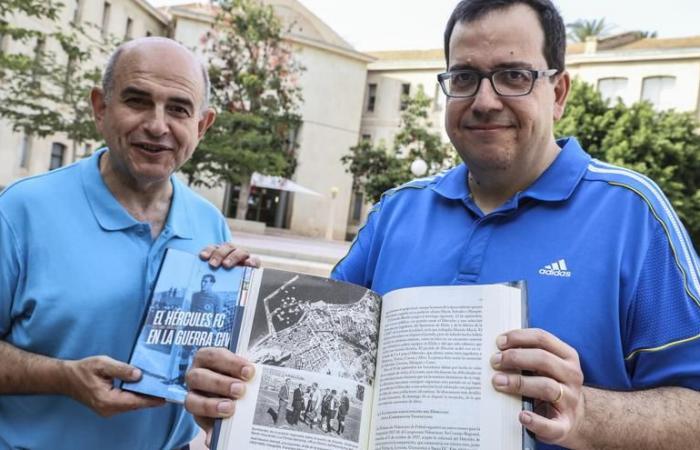From the Hercules of the International to the Hercules of the RegimePilar Cortes
The shops closed that day in 1936 at noon. It was an order. It was also true that from that match played on the afternoon of November 3, neither winner nor loser could emerge. The result, a scandalous and rigged Six to six. No one complained. It was a match “between players who were brothers in ideology and social aspirations,” according to the chronicles. In the Bardin stadium, after a little more than three months of war, the Internationale was played. Also the Riego anthem. There were no political leaders, but there were footballers, those who remained from that brilliant squad that had just finished sixth in its debut in the First Division just half a year before. Hércules faced a selection of sailors from the ship Russian merchant ship Transvaltdocked in the port to bring in supplies and clothing. It was a party, the public invaded the field after the end and the Soviet players, who of course wore red, were carried out on shoulders.
This is one of the many stories that rescues from oblivion «Hercules FC in the Civil War». The book, work of the scholars Luis Hernández and Josep Miquel Garcia, is an exquisite navigation diary of the Alicante club during the fateful three years of the conflict. “In this work we have brought to light multiple stories that remained hidden, some of great harshness, and all deserve to be remembered in an exercise of Herculean historical memory,” says Garcia. Hercules was no exception, he lived the drama up close like any family and several of its members did not return: His coach Manuel Suárez de Begoña was shot and the Winger Mendizábal died in the line of duty after losing control of his plane.
One of the chapters of the book
Beyond these stories known to the average Herculanothe book brings to light silenced details, silenced by the press of the time or simply unknown. One of them is the participation of the club bus in carrying out prisoners. Another is the luck that the club had with its stadium, which at the end of the war had barely suffered any damage. “Mestalla, for example, was bombed and then a concentration camp,” says Hernández. In Alicante, much of the blame for Bardin’s perfect stadium lay with an unknown figure, that of secretary José Navarro Alemañ.
The book analyzes what happened to Hercules in the social, institutional and sporting context. Not only are the well-known repressions of players like Maciá or Blázquez counted, but also It puts the spotlight on the managers, interchangeable pieces at the time as the war progressed. and especially when it finished. “In 1939 a ‘dedemocratization’ of football began, the managers had to be from the Regime,” reveals Garcia. At the end of the War the League resumed its fight and Hércules, undermined by the deaths and arrests of players who had fought for the Republic, finished in a worthy sixth place. “However, because Alicante was the last city to fall, the players were shouted ‘reds’ in the stadiums,” recalls Hernández.
The teams changed their name due to their hatred of any foreign name from the Franco regime, and Hercules, like Barça and Sevilla, changed its initials from FC to CF. “We did not recover the original name, but restoring it now would be a good tribute to its founder, remembering that the name was censored by an organisation external to the club,” Garcia reflects. “Hercules FC in the Civil War” is the result of rigorous research in various archives in the country and has not had institutional support, something that is now common: “Then they are the first to show off their Herculesism with successes such as promotion,” Garcia criticises.
The book will be presented this Friday (7:30 p.m.) at the headquarters of the UA on San Fernando Street, in an event led by journalist Carlos Cuenca. “It will appeal to both veteran and young fans, as well as lovers of the history of Alicante,” explains Hernández.


